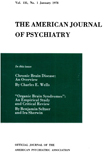A Study of Prediction and Outcome in a Mental Health Crisis Clinic
Abstract
Sixty-eight patients who came voluntarily to a crisis intervention clinic were randomly assigned to one of two groups. Those in the first group received immediate intervention therapy while those in the second were put on a waiting list. By the end of six weeks (and after minor changes in the makeup of the groups were taken into account) there was no significant difference in the psychiatric morbidity scores of the two groups; both had improved. The authors used a variety of pretreatment and posttreatment measures and found that the best predictor of a patient's condition at the end of six weeks was his pretreatment psychiatric morbidity score. The authors conclude that individuals vary in both their reactions to life crises and their therapeutic needs and that the central issue may not be the recovery itself, but the difficulty and pain with which it is achieved.
Access content
To read the fulltext, please use one of the options below to sign in or purchase access.- Personal login
- Institutional Login
- Sign in via OpenAthens
- Register for access
-
Please login/register if you wish to pair your device and check access availability.
Not a subscriber?
PsychiatryOnline subscription options offer access to the DSM-5 library, books, journals, CME, and patient resources. This all-in-one virtual library provides psychiatrists and mental health professionals with key resources for diagnosis, treatment, research, and professional development.
Need more help? PsychiatryOnline Customer Service may be reached by emailing [email protected] or by calling 800-368-5777 (in the U.S.) or 703-907-7322 (outside the U.S.).



